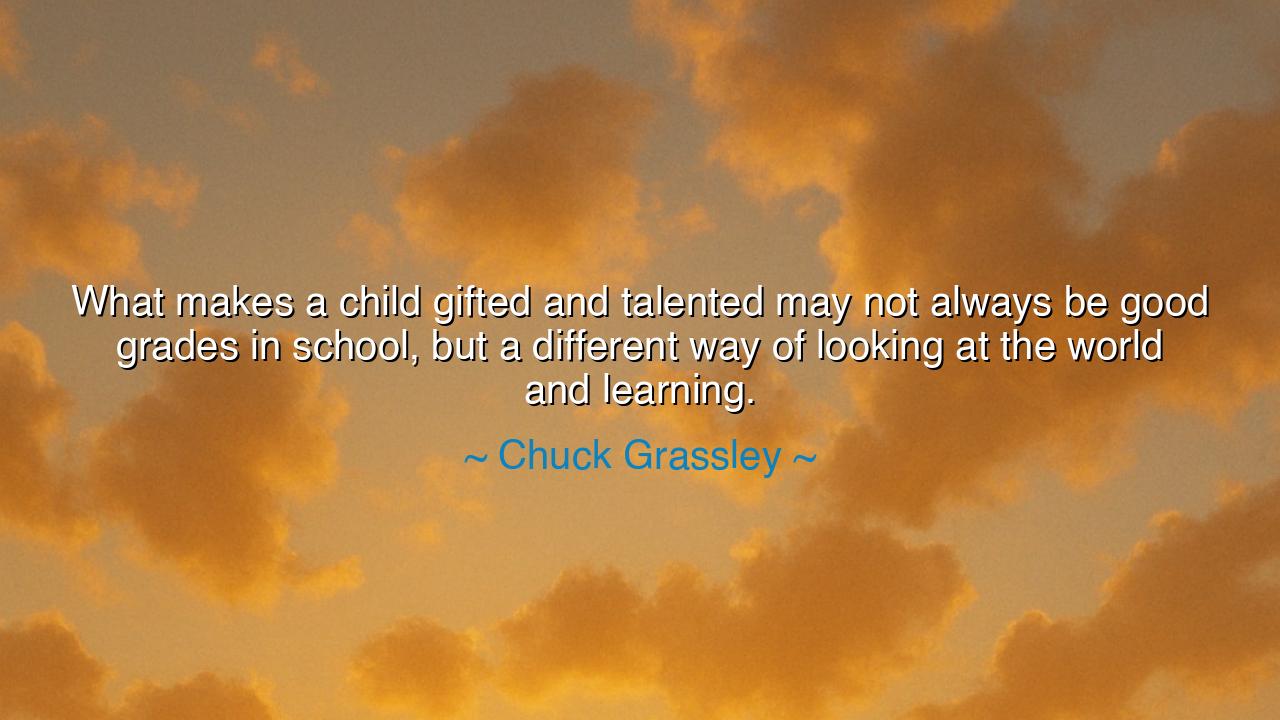
What makes a child gifted and talented may not always be good
What makes a child gifted and talented may not always be good grades in school, but a different way of looking at the world and learning.






“What makes a child gifted and talented may not always be good grades in school, but a different way of looking at the world and learning.” — thus spoke Chuck Grassley, a man of public service, but also of simple wisdom, who saw in the hearts of children something greater than the numbers written beside their names. In this reflection lies a truth as old as humanity itself: that true intelligence is not measured by conformity, but by curiosity — not by memorization, but by vision. The spirit of learning, Grassley reminds us, is not a race for grades, but a journey of perception, where the most gifted among us are often those who dare to see differently.
Grassley’s words arise from the wisdom of observation — from a lifetime spent seeing how the world often mistakes conformity for ability. In schools, in workplaces, even in homes, we are taught to value neatness over imagination, obedience over originality. Yet history itself stands as witness against such blindness. The greatest minds — the Einsteins, the Da Vincis, the Edisons — were not always those who earned the highest marks or followed the clearest path. They were the dreamers, the questioners, the wanderers who refused to accept the world as it was, and instead reimagined what it could be.
To say that a child is gifted is not to say they fit perfectly into the mold of expectation, but rather that their mind burns with a spark uncontained by walls. Some learn by reading, others by touching, by building, by failing. The wise teacher, the wise parent, recognizes this truth — that learning has many faces, and that talent is a river which finds its own course if not dammed by misunderstanding. Grassley’s words, though simple, strike deep: a different way of looking at the world is not a flaw to be corrected, but a gift to be nurtured.
The ancients, too, honored this idea. The philosopher Socrates, who himself never wrote a single book, was condemned by his city for teaching youth to question rather than to obey. Yet from his questioning came the very foundation of Western thought. His greatest student, Plato, would later write that education is not the filling of a vessel, but the kindling of a flame. This flame — curiosity, wonder, and the courage to see differently — is what Grassley calls the essence of a gifted and talented mind. It is not born from perfect grades, but from a soul that dares to look at the familiar and ask, “Why?”
Consider the story of Thomas Edison, the boy who was expelled from school because his teachers found him slow and inattentive. They said he could not learn — that his mind wandered too much. But his mother, seeing the fire in his eyes, became his teacher and let him explore freely. That same boy grew to hold over a thousand patents and illuminate the world with light. Edison did not learn as others did; his way of learning was experimentation, curiosity, and unrelenting trial. He proved Grassley’s truth long before it was spoken: that genius does not always follow the lesson plan.
The danger, Grassley warns us, is that society too often values results over discovery, and in doing so, crushes the very creativity it needs to survive. When we measure children by grades alone, we mistake the map for the landscape, the symbol for the soul. A child’s mind is a living forest — some trees grow tall and straight, others twist and bloom in strange directions — but all reach for the same light. To nurture true talent, one must water every kind of seed, not just the ones that grow neatly in rows.
Therefore, my children, remember this: judge not a mind by its grades, but by its wonder. Do not ask merely what a child knows, but what questions stir within their heart. Celebrate not only those who succeed by the system’s measure, but also those who see the world with strange, beautiful eyes. For these are the ones who will paint new skies, write new music, build new worlds.
Let Grassley’s words be a reminder and a call: learning is not obedience, but discovery; not the memorization of answers, but the courage to ask new questions. So let us teach our children to see differently — to think freely, to fail boldly, to imagine endlessly. For in every child who sees the world anew, the future is born again. And in honoring not their grades, but their way of seeing, we honor the divine spark of creation itself — the eternal gift that makes humanity both humble and infinite.






AAdministratorAdministrator
Welcome, honored guests. Please leave a comment, we will respond soon